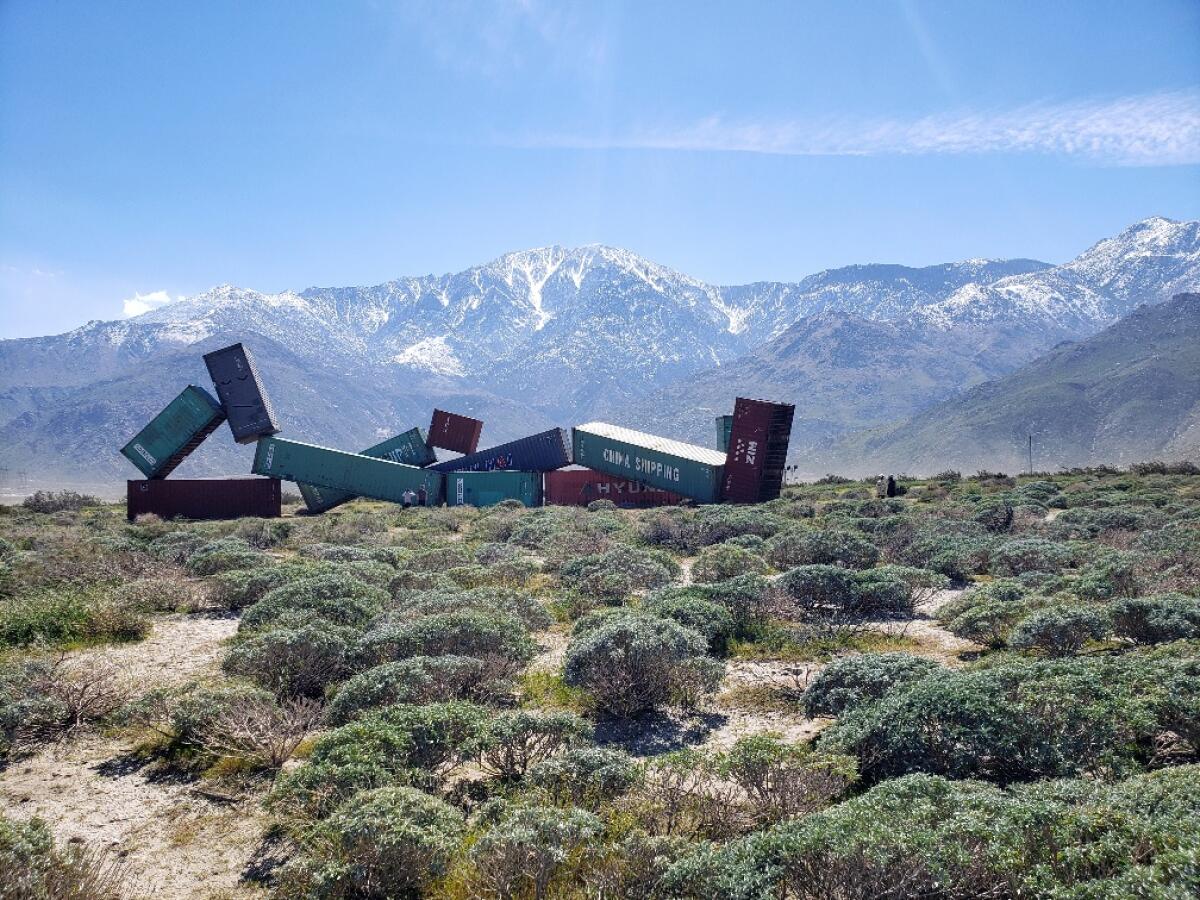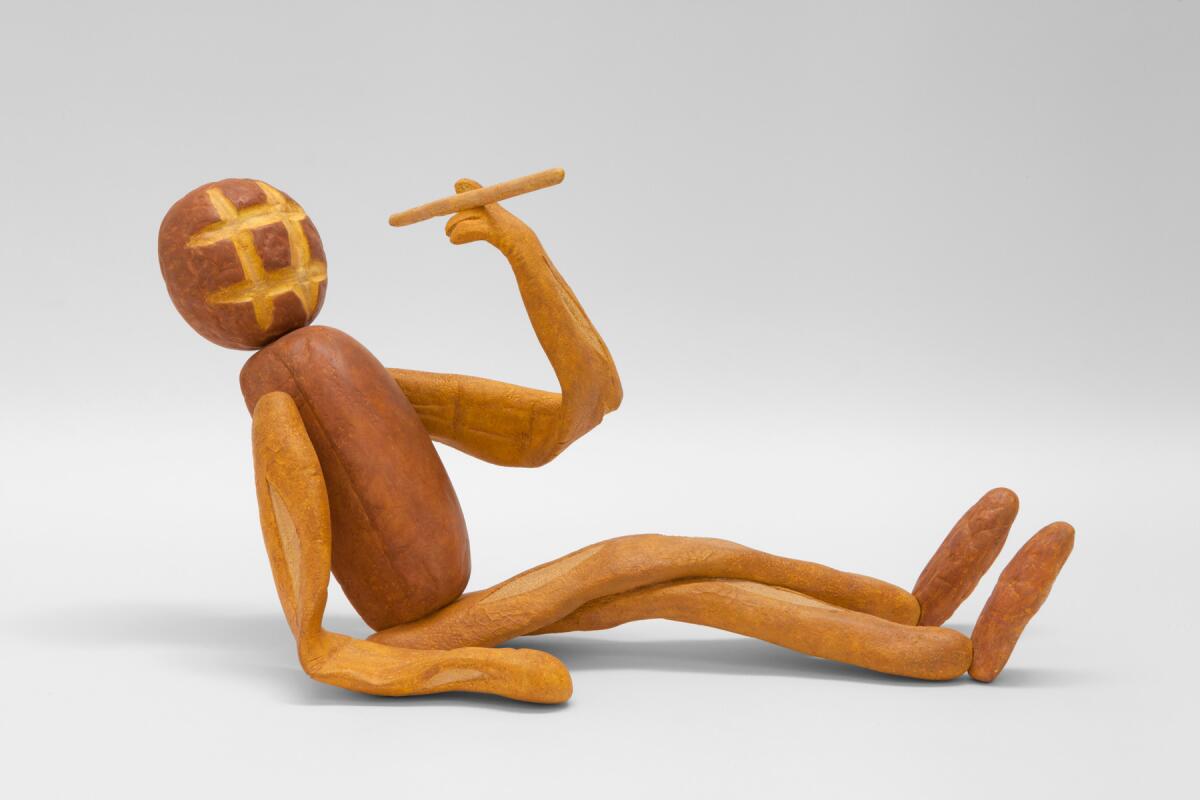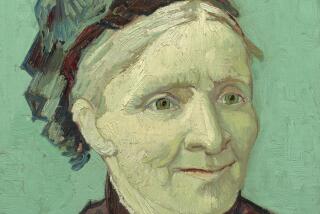Review: This sculptural trainwreck in the Coachella Valley is worth celebrating

The wind was whipping hard, blowing gritty clouds of sand across the landscape scrub at the edge of Palm Springs on opening day of Desert X 2023, the fourth installment of the Coachella Valley biennial exhibition of newly commissioned art. (Neville Wakefield and Diana Campbell are the curators.) At moments during the nearly half-mile trek to the rugged site of Matt Johnson’s massive sculpture, “Sleeping Figure,” from a dusty parking area just off the I-10 near the Palm Springs turnoff at Highway 111, it was difficult to stand upright. The sturdy sculpture, however, didn’t budge an inch.
A dozen salvaged railway freight cars are securely welded in place, end to end and, in some places, piled high. The topsy-turvy forms conjure a surprise suggestion of a human body casually reclining in the rocky field. It’s an industrial-strength pastoral, the artistic genre that used to signal the dominion of humankind over nature.
Here, however, the dramatic gesture is more ambiguous. The splendid colossus takes on the mythologies of land art unique to the West in the last half-century, at once celebrating and questioning the vaunted legacy of artists like Robert Smithson, Michael Heizer, Nancy Holt and Walter De Maria, whose monumental sculptures reside in remote desert sites from Utah to New Mexico. And it artfully raises the stinging issue that has plagued Desert X since 2019. That’s when organizers, apparently indifferent to the state-led murder of Washington Post journalist Jamal Khashoggi, regrettably forged a working relationship with Saudi Arabia, the vicious and repressive absolute monarchy where free speech is illegal.
That arrangement badly damaged the biennial’s reputation. Prominent Desert X board members quit in protest, including artist Ed Ruscha, who for decades has had a getaway in nearby Pioneertown. Despite the outcry, the pact has led to two Saudi desert exhibitions, the most recent in 2022.

“Sleeping Figure” is not just the most compelling entry in the current iteration of the biennial, an otherwise bland affair featuring a dozen works, few of which do much to reward the considerable effort to see them. (Be prepared for a 50-mile trek to get to all 12 sites, most scattered between Desert Hot Springs and Palm Desert and at the same locations as works from prior years.) Of the 59 commissions produced since the series launched in 2017, Johnson’s sculpture is among the very best.
The freight cars’ jaggedly rising and falling composition echoes the craggily beautiful backdrop of the San Jacinto mountain range. Its slam-bang visual pileup plays against a long, steady stream of freight trains rolling past behind it, day and night, in a manufactured river transferring tons of cargo from the Port of Los Angeles to distribution centers to the east. Inevitably, if coincidentally, disasters like last month’s toxic freight-train derailment in East Palestine, Ohio, come to mind, as does the historic mix of staggering prosperity and shameful ruin that the railroads brought to the building of America.
Unexpectedly, given the enormous sculptural materials and their social history, the rise and fall of shapes make for a light, airy, porous reclining body, its head resting on a hand at the end of a propped arm, while one leg is casually crossed over the other. Given a standard freight-car length of 50 or 60 feet, the colossus stretches out to nearly two-thirds the span of a football field.
It’s not the artist’s first such composition. Six years ago, for example, Johnson, who works in Los Angeles, made a similarly posed figure for a tabletop. That witty sculpture’s limbs and torso are carved and painted to look like sustaining loaves of bread. “Take, eat,” the cigar-chomping bread figure cheekily implies; “this is my body.”

The recumbent body built from freight cars is without gender, although typically in art a reclining figure is female. Think of assorted voluptuous, sleeping Venuses by Titian or Giorgione, languorous nudes that are like some exquisite Renaissance Playboy centerfold designed for the private gratification of an inevitably male patron. Édouard Manet gave a Modern jolt to the tradition, juxtaposing a nude woman with some fully clothed men picnicking in a wooded park for his painting “Luncheon on the Grass,” and sitting the nude sex worker in “Olympia” bolt-upright on a daybed, staring down the viewer.
It started as a promising California art biennial. It’s now a partnership with a government linked to human rights abuses and the killing of a journalist.
Ingres and Matisse transformed the reclining body into an odalisque, dressing their women in sheer harem pants and silk turbans, decorating them with bejeweled peacock-feather fans. The reclining female nude was stereotyped as “exotic,” a patronizing Orientalist motif fueled by aggressive Near Eastern exploits of 19th century European colonial powers. She was to be taken, like a foreign territory, subjugated to a greater power’s desires.
Johnson’s “Sleeping Figure” is a mercantile odalisque, draped in Orientalist trappings of corporate Asia that are announced by prominent commercial names painted on the railway containers’ sides — Hyundai, Dongfang, Zim, China Shipping and more. The sculpture’s gender ambiguity ribs our habit of projecting comforting feminine traits onto the landscape — think Mother Nature — a habit with which we give ourselves permission to take advantage of it. In a globalist world, who knows who is taking advantage of whom?
Johnson’s reclining metal torso punctured with holes and set in an actual landscape also recalls the primordial bones of Henry Moore bronzes scattered across Britain’s Hertfordshire countryside. Moore’s organic shapes are changed into Minimalist boxes, updating a romantic sculptural legacy into something akin to a Hasbro Transformer. Johnson’s composition, regardless of all that tonnage, feels almost toy-like, as if made by a kid playing with blocks.
Check out the figure’s head: It features a rudimentary face defined by an angular slash for a mouth, topped by a pair of painted arcs for closed eyes. The pictogram is a clever cross between two digital Unicode signs — the arcs denoting slumber, the slash designating confusion. The “sleep of reason” is made into an emoji. Machine forms collide with digital fictions to compose a corporate odalisque now in bed with the vast “Oriental” wealth of Saudi criminals. Culture eclipses nature, despite the wild and enveloping desert environment.
Johnson’s crack-up inserts a nagging question mark into the very idea of mammoth land-art projects. They’re rife with boy’s toys meant to last an eternity, like the milelong Minimalist temple complex of Heizer’s “City,” recently opened to accommodate six visitors a day (at $150 a pop) in remote Nevada, or James Turrell’s grandiose sky observatory in an extinct volcano at the edge of Arizona’s Painted Desert, still unfinished after more than 40 years’ labor and hundreds of millions of dollars spent.
As an emblem for Desert X and its decadent embrace of Saudi thugs, an Orientalist train wreck is hard to beat. Johnson’s “Sleeping Figure” steals the show. And when’s the last time land art made you laugh out loud?
Desert X 2023 is on view throughout the Coachella Valley through May 7. Maps and app information are available on the exhibition website, desertx.org.
More to Read
The biggest entertainment stories
Get our big stories about Hollywood, film, television, music, arts, culture and more right in your inbox as soon as they publish.
You may occasionally receive promotional content from the Los Angeles Times.











